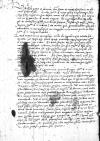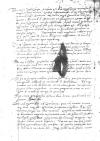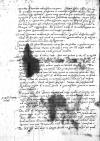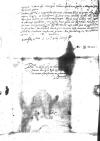List #1051
Mauritius FERBER do Ioannes DANTISCUSHeilsberg (Lidzbark Warmiński), 1533-12-03
| odebrano [1533]-12-04 Rękopiśmienne podstawy źródłowe:
Pomocnicze podstawy źródłowe:
Publikacje:
| ||||||||||
Tekst + aparat krytyczny + komentarzZwykły tekstTekst + komentarzTekst + aparat krytyczny
Reverendissimo in Christo patri et domino, domino
Reverendissime in Christo pater et domine, domine frater et amice carissime ac plurimum honorande.
Litteras Reverendissimae Dominationis Vestrae ex ipsius nuntio accepi causasque istas omnes non sine dolore animi ad cor revocavi, quae non minus me quam ipsam Reverendissimam Dominationem Vestram urgent. Et a gravioribus atque adeo ipso domino Stanislao Costka exordium faciens, visum est mihi (salvo saniore Reverendissimae Dominationis Vestrae iudicio) ita contra ipsum procedendum esse, quemadmodum in exemplari a me congesto et ex maiori parte ex litteris Reverendissimae Dominationis Vestrae recepto videbit.
Quod autem in eo exemplari nulla de capulo ensis attacto fit mentio, haec causa est, quod nemo, quantum ego scio, praeter Reverendissimam Dominationem Vestram et me hoc vidit. Et domini forsan de hoc gravatim testimonium praebebunt. Tamen scribam hoc ipsum reverendissimo domino episcopo Premisliensi stain⌈[nsi]nsi stain⌉. Similibus est usus gestibus erga me, cum seorsim illi loquerer, unam manum in altum elevatam, alteram super capulum gladii habens. Et hunc superbum morem eum habere eoque stain⌈[eoque]eoque stain⌉ contra magnificum dominum Georgium a Baysen palatinum Marienburgensem etc. atque etiam Ludowicum de Mortangen castellanum Elbigensem ipsum uti vidi.
Quod magnificus dominus capitaneus Marienburgensis Reverendissimae Dominationi Vestrae suam opem et operam offert, libenter audio, nihil dubitans, quin et plures alios tales habeat fautores et amicos, ita se offerentes. Ceterum rogandus est Dominus Deus, ne illorum ope et opera nobis opus sit. Nam expertus sum, quid mecum in transactione inter sacram regiam maiestatem et ducem Prussiae actum sit, ubi tunc amici mei ostentatione sola causa fuerunt et consilium dederunt, quod contra pacta pacis retenta mihi fuerunt oppida Braunsberg et Tolkemit et anno praeterito subditos meos, vilissimos homines, contra me concitaverunt, ubi et eorum servitores adiuncto sibi subdito meo, plebano meo in Wormedit, insidias tetenderunt. Ita expertus sum, quod nobis ecclesiasticis non bene volunt, unum ore loquentes et aliud corde tenentes. Idcirco summe consulo Reverendissimae Dominationi Vestrae, ut bonam rationem habeat malignitatis horum temporum et hanc causam cum Costka sinat transigi per sacram regiam maiestatem, apud quam sicut ex litteris reverendissimi domini Premisliensis intellexi, iam iecit bonum fundamentum ac quantum suo alto consilio, salvo tamen honore, fieri potest, pacem sibi quaerat.
De causa
Si dominus Zcema vel
De causa Holste praestolari me oportet stain⌈[ortet]ortet stain⌉ rei eventum. Doleo autem vehementer, quod cum tam vili homine de stain⌈[ine de]ine de stain⌉ honore meo contendere debeo, timens, ne mihi soli iam c paper damaged⌈[m c]m c paper damaged⌉um Holste, quod omnibus nobis cum Campe actum est, contingat paper damaged⌈[at]at paper damaged⌉. Scio enim stilum istius curiae.
In his et praemissis omnibus habeat Reverendissima Dominatio Vestra pro sua censura corrigendi, addendi ac minuendi etc. facultatem. Et rogo Eandem, quo velit deliberare et mentem suam cum hoc meo proprio nuntio rescribere, quem propterea mitto, ne Vestra Reverendissima Dominatio nimium in nuntiis sit gravata.
Est etiam pro foribus festum divae Luciae, quod moram non patitur. Igitur etc.
Quod Reverendissima Dominatio Vestra ad  AAWO, AB, D. 8, f. 8r
terrore absterritus, adimplere nequeo. Nam habeo adhuc prae oculis, quod hoc tempore, praesertim in Natalis Christiani diebus, bis ad mortem usque aegrotavi. Spero itaque, quod in hac inevitabili necessitate Reverendissima Dominatio Vestra et alii domini me habebunt excusatum. Nam etiam si ambo in eo
AAWO, AB, D. 8, f. 8r
terrore absterritus, adimplere nequeo. Nam habeo adhuc prae oculis, quod hoc tempore, praesertim in Natalis Christiani diebus, bis ad mortem usque aegrotavi. Spero itaque, quod in hac inevitabili necessitate Reverendissima Dominatio Vestra et alii domini me habebunt excusatum. Nam etiam si ambo in eo
Quod civitates reddunt se ad iurandum in consilium difficiles, nihil aliud de hoc scio, nisi quod in prioribus conventibus in se ad proponendum maioribus suis susceperunt.
Praeterea non esset conveniens, ut ex hoc ita subito a gubernio patriae desisteremus. Nam (ut aiunt) uno ictu non cadit arbor. Oportet i stain⌈[t i]t i stain⌉taque rationes eorum primum audire. Quod ro paper damaged⌈[o]o paper damaged⌉gat Reverendissima Dominatio Vestra, ut has res gestas sacrae regiae maiestati ac reverendissimo domino episcopo stain⌈[episcopo]episcopo stain⌉ Premisliensi describerem, de Campe et Holste ad longum scripsi stain⌈[scripsi]scripsi stain⌉ binis litteris, unas dedi Marienburgi Kostka, alteras [...] paper damaged⌈[...][...] paper damaged⌉, qui hinc celeri cursu in Wilnam concessit. De Costka [...] paper damaged⌈[...][...] paper damaged⌉ non feci mentionem et puto secundum datam litterarum ipsius Ca paper damaged⌈[a]a paper damaged⌉mpe, quod tunc litterae meae erant in manibus ipsius domini episcopi Premisliensis. Vestra Reverendissima Dominatio deliberavit in hospitio meo in
Ex quo autem dominus Zcema nuntius ad regem vadit et seorsum consiliarii scribent, non est mihi visum, ut ultra eorum scripta alias on the margin, in the hand of Nicolaus Human⌈eorum scripta aliaseorum scripta alias on the margin, in the hand of Nicolaus Human⌉ exarem litteras et mihi plus aliquid arrogem, quam ceteri faciunt, quod mihi magis ad insipientiam quam sapientiam imputari posset et spero, quod erit Dominatio Vestra Reverendissima in hoc pro nunc contenta. De domino de Woynow, qui inservit reginali maiestati, nullum comperio mihi a Dominatione Vestra Reverendissima ad reginalem maiestatem scribendi modum datum. Si utique voluerit, ut scribam, det mihi argumentum. Sed arbitror conveniens, ut hoc negotium usque ad reditum domini Czema, cum quo reginalis maiestas desiderat loqui, quiescat. De litteris
ill(ustris) or ill(ustrissimi)⌈ill(ustris)ill(ustris) or ill(ustrissimi)⌉
domini ducis in causa Fincke et Sperling nihil est, quod
 AAWO, AB, D. 8, f. 8v
moveat or moneat⌈moveatmoveat or moneat⌉. Viderit ipse. Scio ipsum talem, quod non facile a concepto suo declinari possit.
AAWO, AB, D. 8, f. 8v
moveat or moneat⌈moveatmoveat or moneat⌉. Viderit ipse. Scio ipsum talem, quod non facile a concepto suo declinari possit.
Tandem Reverendissimam Dominationem Vestram rogo, velit haec mea omnia tam bono et grato animo suscipere, legere et interpretari, quam sunt a me candido quidem animo, sed non sine labore et anxietate scripta. Et si quid eidem Vestrae Reverendissimae Dominationi adversi accidere written over i⌈iee written over i⌉t, pro posse meo ipsam non destituam. Nam scio nihil eam vel petituram vel desideraturam, nisi quod fert et possibilitas et honestas. Quam et superinscribed, in the hand of Nicolaus Human⌈etet superinscribed, in the hand of Nicolaus Human⌉ Dominus Deus pro mutua nostra amicitia diutissime salvam et incolumem conservet, precor.
Ex
Eiusdem Reverendissimae Dominationis Vestrae totus bonus frater



